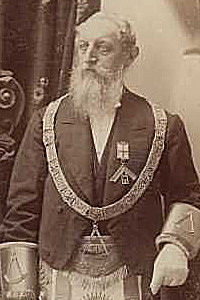Here is something to frame and hang on your wall nearby where you can glance at it now and then. This excerpt is taken from the “address to the brethren” given very close to the end of the installation of the officers of a lodge according to the “English” or British Columbia “Canadian Work” It comes from the Masonic Publication “The Educator” (http://www.theeducator.ca/ritual-2/the-personification-of-a-mason/) but seems to be an adaptation of an original piece of work, “The Ideal of a Freemason,” written by Brother Otto Klotz in the mid 1800s. According to Cal Christie the piece “The Ideal of a Freemason” was written by Bro. Otto Klotz and incorporated into the General Charge at Installation of Lodge Officers in the Ontario working
“Born in Kiel, Holstein Germany, brewer and hotelier, Otto Klotz, immigrated to Preston, Ontario in 1837. Within a year, he was elected to the Board of School Trustees where he served as secretary-treasurer, almost without break, from 1839 to 1891. In 1845 Preston’s school became Ontario’s first “Free” school.
He also served as Chief Engineer of the Preston Fire Brigade in 1850, Justice of the Peace in 1856, and, among other offices, was the President and long time director of the Waterloo County Agricultural Society.
Highly regarded by Ontario Freemasons, he was made an Honourary Past Grand Master in 1885. Excerpts from an article he wrote, published in The Canadian Craftsman on 15 March 1868, entitled “The History of Freemasonry” have been incorporated into the ritual of most lodges in Canada as The Ideal of a Freemason.”
- from: http://freemasonry.bcy.ca/biography/klotz_o/klotz_o.html
The Personification Of A Mason
“If you see a man who quietly and modestly moves in the sphere of his life ; who, without blemish, fulfills his duty as a man, a subject, a husband and a father; who is pious without hypocrisy, benevolent without ostentation, and aids his fellowman without self-interest; whose heart beats warm for friendship, whose serene mind is open for licensed pleasures, who in vicissitudes does not despair, nor in fortune will be presumptuous, and who will be resolute in the hour of danger.”
“The man who is free from superstition and free from infidelity; who in nature sees the finger of the eternal master; who feels and adores the higher destination of man; to whom faith, hope and charity are not mere words without any meaning; to whom property, any, even life, is not too dear for the protection of the innocence and virtue, and for the defence of truth;”
“The man who towards himself is a severe judge, but who is tolerant with the debilities of his neighbour; who endeavours to oppose errors without arrogance, and to promote intelligence without impatience; who properly understands how to estimate and employ his means; who honours virtue, though it be in the most humble garment, and who does not favour vice though it be clad in purple; and who administers justice to merit whether dwelling in palaces or cottages.”
“The man who, without courting applause, is loved by all noble-minded men, respected by his superiors and revered by his subordinates; the man who never proclaims what he has done, can do, or will do, but where need is, will lay hold with dispassionate courage, circumspect resolution, indefatigable exertion and rare power of mind, and who will not cease until he has accomplished his work, and who then, without pretension, will retire into the multitude because he did the good act, not for himself, but for the cause of good.”
“If you, my friend, meet such a man, you will see the personification of brotherly love, relief and truth; and you will have found the ideal of a Freemason.”
Worshipful Brother Otto Klotz

